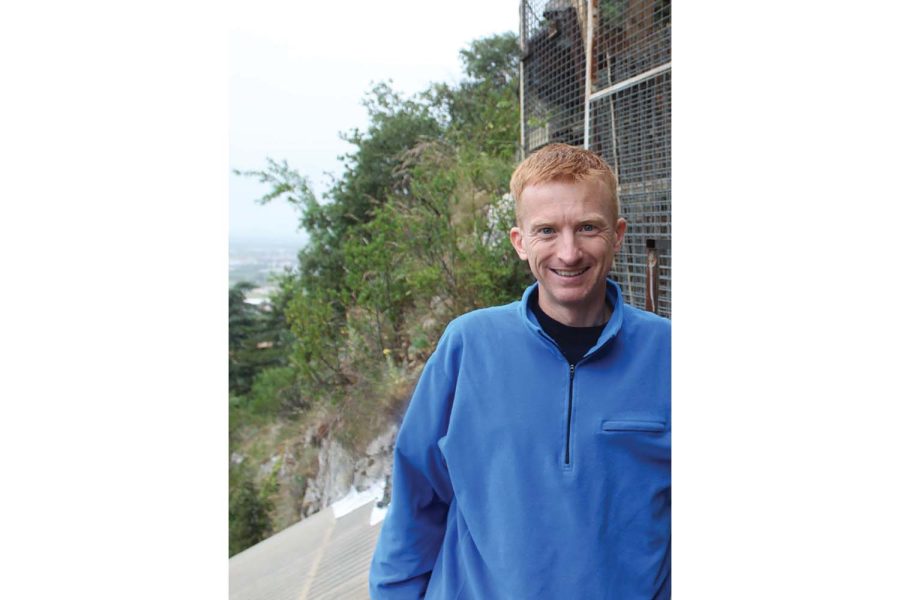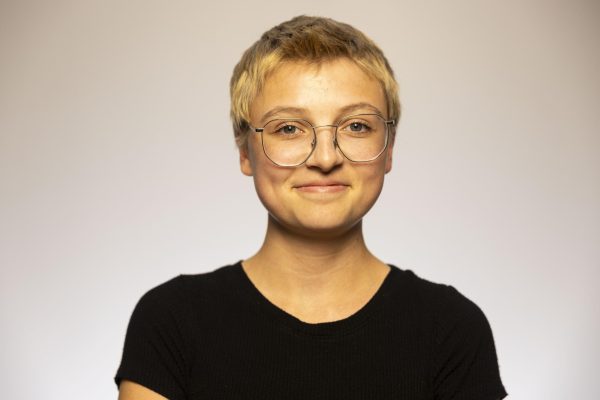Ask the Author | David DeGusta
Author and second-year MFA student in the Iowa Writers’ Workshop, David DeGusta discusses his career and upcoming Prairie Lights conversation in this week’s “Ask the Author,” including his shift from paleoanthropologist in Ethiopia and Djibouti to fiction writer and translator.
September 20, 2022
David DeGusta is a second-year MFA student in fiction at the Iowa Writers’ Workshop. On Sept. 25, he will take part in a conversation at Prairie Lights bookstore as part of the International Writing Program at Prairie Lights Sunday Reading Series. His writing has been featured in “Boulevard” and “Catapult,” among other publications and will be included in the upcoming “Best New Writers 2022” anthology from the Masters Review. The short story writer also translates works written in Amharic, the national language of Ethiopia. Before switching to fiction, he worked as a paleoanthropologist in Ethiopia and Djibouti.
RELATED: Ask the Author | Tom Montgomery Fate
The Daily Iowan: What inspired you to become an author or get involved in writing?
David DeGusta: I think it’s a natural extension of being very into reading books — like “hey, could I maybe make one of my own?” And then when I tried writing in a serious way, it felt like I was really using all the parts of me. You have to be creative and rigorous and empathetic and practical and philosophical and deeply engaged with language, and a bunch of other stuff, all at once.
DI: Do you have a favorite piece you’ve ever worked on or published?
DeGusta: My favorite is a short story that will be published early next year, “The Tree That Stood Alone in the Desert.” That story will always be special to me because I used it to apply to two summer writing programs, the Sewanee Writers’ Conference, and a summer session workshop here at Iowa. Those experiences were incredibly formative for me. I got to know some really amazing cool people and I’m so grateful for that, even beyond the writing. It’s a good example of how writing can connect you with people in a very real way, not just in the abstract.
DI: What initially made you interested in the Iowa Writers’ Workshop?
DeGusta: When I decided to switch careers to writing, I wanted to get the best training I could. Many of my favorite writers had some connection to the Iowa Writers’ Workshop, and it attracts such a wonderful group of people. Between students, faculty, and visitors, it was my dream choice. Just in general, I think if you want to get better at something, try to hang out around the very best people doing that thing. For writing and translation, Iowa is the place.
DI: What are you most excited about for the upcoming IWP Prairie Lights reading?
DeGusta: Make art, share art. That’s what it’s all about, to me. And so, I’m excited for the chance to share some of my writing in the company of two other wonderful writers, Pavla Horáková and Carey Baraka, at such a distinguished venue as Prairie Lights. It’s like the literary equivalent of playing Madison Square Garden, with all the great writers that have come through there. I just hope some of that magic rubs off. Plus, Iowa City audiences know literature the way people in New Orleans know jazz.
DI: Have you ever worked with the International Writing Program before?
DeGusta: The International Writing Program spoils us here in Iowa City. Every fall, they bring the world of literature to us, and create so many opportunities for Iowa students. I took a translation workshop through them and, also, did a session with their visiting writer Luíza Fazio on television writing. Luíza wrote for the most popular Netflix show in her native Brazil and was working on a new show here that she shared with us. That’s someone whose words reach literally millions of people, so to sit in a room and have a conversation with her about her writing process was really incredible.
DI: You were a paleoanthropologist before switching to writing. What led you to change paths?
DeGusta: I worked for a while in publishing as an undergraduate and afterwards and was really torn between continuing with writing and editing or going into science. I decided to pursue human origins as a career and am so glad I did. I got to do cool stuff, like finding fossils in Ethiopia, excavating Neanderthals in France, and working on the Human Genome Project. I wouldn’t trade any of that for the world. But then it came to a point where I needed to switch universities, and that caused me to stop and think about what I really wanted to do next. I realized I had done most of what I wanted to do in the field of human evolution. Writing, while an old love, was a new frontier, so that’s where I headed.















